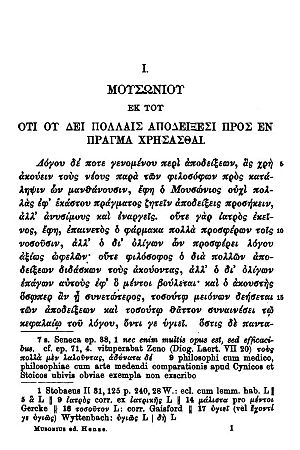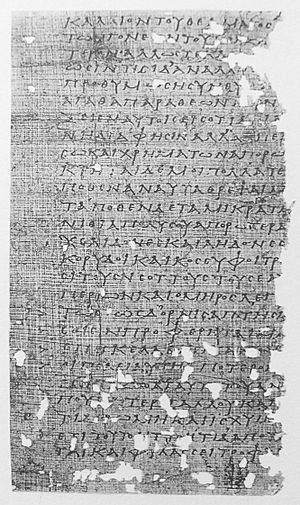Gaius Musonius Rufus facts for kids
Quick facts for kids
Gaius Musonius Rufus
|
|
|---|---|
| Born | c. AD 20 – 30 Volsinii, Etruria
|
| Died | As late as AD 101 |
| Nationality | Roman |
| Other names | Musonius Rufus |
| Era | Ancient philosophy |
| Region | Western philosophy |
| School | Stoicism |
Gaius Musonius Rufus was an important Stoic philosopher from ancient Rome. He lived in the 1st century AD. He taught his ideas in Rome when Nero was emperor.
Because of his teachings, he was sent away from Rome in 65 AD. He could only come back when Galba became emperor. Later, another emperor, Vespasian, let him stay in Rome. This was special because Vespasian sent all other philosophers away. However, Musonius was also banished later, returning only after Vespasian died. We still have some of his lectures today. He is also known for teaching famous students like Epictetus.
Contents
Life of Musonius Rufus
Musonius Rufus was born around 20–30 AD in Volsinii, a city in Etruria. His father was a Roman eques, which was a social class in ancient Rome. By the time Nero was emperor, Musonius was already well-known in Rome. He taught Stoic philosophy there.
Challenges Under Emperor Nero
Musonius was connected to a group called the Stoic Opposition. This group spoke out against what they saw as Nero's unfair rule. Musonius was sent away from Rome in 60 AD, following another person named Rubellius Plautus. He came back to Rome after Plautus died in 62 AD.
However, Musonius's teachings made Nero's court suspicious of him. He was sent away again in 65 AD to an island called Gyarus. This happened because he was falsely accused of being part of a plot against Nero. Gyarus was a very harsh place, but Musonius managed to survive. He even formed a small group of philosophers there. He later wrote about how his time in exile helped him practice Stoicism.
Returning to Rome and Later Exile
Musonius returned to Rome in 68 AD when Galba became emperor. In 69 AD, when a general named Marcus Antonius Primus was marching towards Rome, Musonius joined a group sent to meet him. He tried to convince the soldiers to choose peace over war, but he was stopped.
Later, Musonius helped to convict Publius Egnatius Celer. This philosopher had wrongly accused another person. It was around this time that Musonius taught Epictetus, who became his most famous student. Musonius was so respected that Emperor Vespasian allowed him to stay in Rome in 71 AD. This was unusual because other philosophers were banished. But Musonius was eventually exiled again around 75 AD. He only returned to Rome after Vespasian died in 79 AD. We know he died by 101 AD.
Musonius's Writings
We don't know if Musonius himself wrote any books. His ideas were mostly written down by two of his students. One student, named Lucius, collected his lectures. These form the 21 long parts that we still have today. Another student, Pollio, also collected his teachings, but that collection is now lost. We only have a few small pieces of it from other writers.
Musonius's Philosophy
Musonius's philosophy is very similar to that of his student, Epictetus. It focuses a lot on practical actions. He believed that philosophy wasn't just about words or school lessons. Instead, it was something everyone could learn and practice through their own thoughts and actions. He thought a philosopher should look the part, with long hair and simple clothes. He also believed philosophers should avoid too much social life.
The Power of Philosophy
Musonius was sure that philosophy could greatly influence people's minds. He hoped it could fix all the bad parts of human thinking. His philosophy was all about rules for living a good life. He believed that all knowledge should help us act better. He didn't completely reject logic, but he didn't like how many rules and ideas some philosophers used just to show off.
He didn't focus much on the physical ideas of the Stoics. He believed that the gods knew everything without needing to think. He thought the human soul was like the gods. He also agreed with other Stoics that the soul was physical. He believed the soul could be cleaned and made pure again after being affected by the body. He strongly said that the thinking part of the soul (called dianoia) was free.
Focus on Ethics and Virtue
Musonius paid much more attention to ethics than to logic or physics. He thought philosophy was simply studying and practicing what is right and necessary. For him, philosophy was just trying to live a good and virtuous life. He believed that everyone, both men and women, should study philosophy. He saw it as the only sure way to become virtuous.
He thought it was easy to follow one's own nature. The biggest problem he found for living a truly moral life was the bad ideas people learned as children. Also, bad habits that became strong over time were a problem. He saw philosophy as a way to heal the mind. He stressed practicing virtue, saying that doing good was more important than just talking about it. He described two kinds of practice:
- Training the mind through thinking and following good rules.
- Enduring physical pains that affect both the soul and body.
Living a Simple and Natural Life
A life lived according to nature, for Musonius, meant being social and friendly. It also meant being happy with just what you need to survive. He was against all selfishness. He saw marriage as natural and important. He believed it was the basis of family, society, and the survival of all people.
He gave very detailed rules for living a simple life. He had specific advice for diet, body care, clothing, and even furniture. For example, he suggested letting hair grow long and not cutting it too short. He also honored the beard, saying that hair was given by nature to cover the body. He advised against eating meat. He preferred foods that nature provides over those that need a lot of cooking.
Musonius argued that men and women have the same ability to understand virtue. Because of this, he believed both should be trained in philosophy.
Images for kids
See also
 In Spanish: Musonio Rufo para niños
In Spanish: Musonio Rufo para niños
 | Kyle Baker |
 | Joseph Yoakum |
 | Laura Wheeler Waring |
 | Henry Ossawa Tanner |





